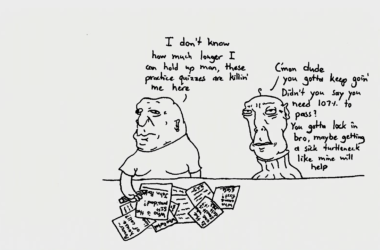A little over a year ago, I reached a metaphorical wall in my life. I had left my job to focus on school, but as a keener (and overachiever), I felt like my undergraduate degree had little to offer. At that point, my time at McGill had been extended by a year, meaning I had two extra semesters of academic real estate to build on. In a combination of my ambition and interest, I decided to apply for the Honours Urban Studies program and take on an undergraduate thesis. A year in, I’m here to offer some pieces of advice for those of you who, like I was, are questioning taking this big step in their degrees.
How can I find a topic?
A thesis is a big deal. Even if it’s smaller than one you might write in grad school, it’s still around 50 pages, depending on your program. This means you really need to enjoy your topic. Maybe you already know what you want to write about, and you’re ruminating on data collection methods and potential hypotheses. But if you’re like me, the only thing you know at this stage is that you want to produce some kind of knowledge.
Luckily for me, my department has an honours seminar, where we were presented with an extensive document of projects our faculty needed help with, and it just so happened that one of the pitches stood out to me—I found myself drawn to residential energy poverty and its potential solutions. However, if you aren’t as lucky as I was, reaching out to the professors in your department is also a great first step. Chances are, your interests may align with theirs.
Will I be able to write that much?
You haven’t even begun your thesis, and you’re already anxious at the idea of organizing all your thoughts into one big document. This is normal; your brain probably can’t wrap itself around the magnitude of a project you haven’t yet started working on. Take things one day at a time, and don’t overwhelm yourself by trying to figure it all out at once.
Typically, your data collection and analysis is done during the summer, which leaves you with plenty of time in the fall and winter semesters for writing. I will say that this may vary based on the length of your writing period as determined by your program. Regardless, there’s no such thing as a linear path. If you can’t collect all your data in the period you determined, be kind to yourself and take your time. It’ll all work out in the end.
Going back to the previous section, remember that while a thesis may seem hard to grapple with right now, it’s actually just small parts made of smaller parts, strung together into one big manuscript. Notion is a very popular online time and space organizer that you might be familiar with—although I personally like an old-school planner and notebook to keep track of my thoughts.
What if an entire thesis is just too much?
There have been times when I have doubted my ability to write so many words on my topic, despite my passion for it. Sometimes stress gets the better part of me. The truth is that a thesis is no small feat, and while it’s entirely doable, it’s also a big commitment. Personally, I spent an entire summer collecting data, thinking over potential interpretations in my spare time. If you have a passion project that you want to try out for a semester, perhaps look into whether your department offers any three-credit independent research courses.
If you read this piece, chances are the research bug has bitten you and you are trying to figure out if this is something you want. Even if a thesis seems daunting now, I highly encourage you to give it a try. It’s hard work, but the entire process is incredibly rewarding. Ultimately, you’ll conclude your degree with a concrete piece of work that you’ll be proud of for years to come.









